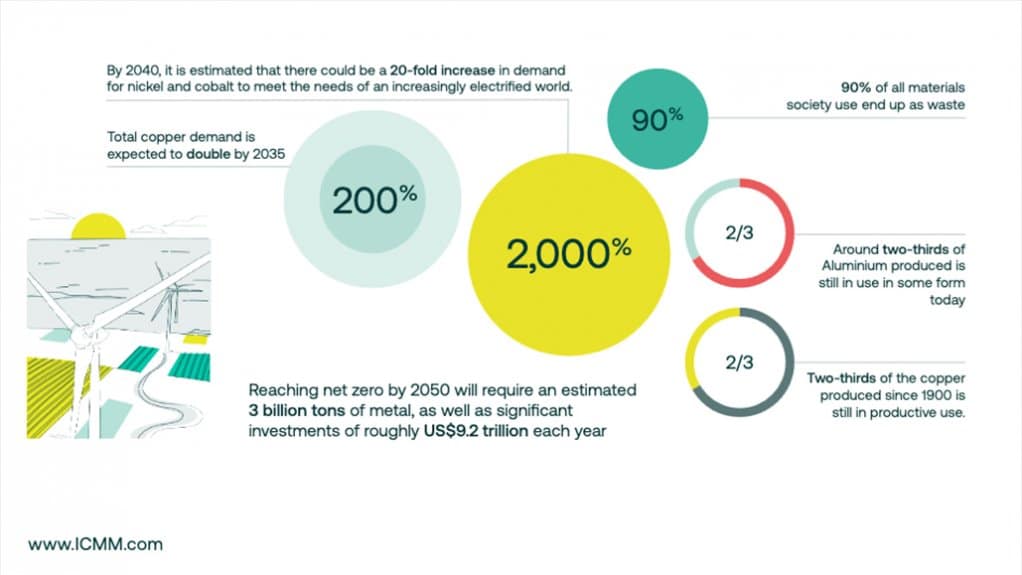In setting up to accelerate a global circular economy, the International Council on Mining and Metals (ICMM) will be focusing on the value chains of wind turbines and solar photovoltaic panels and zeroing in on aluminium, copper, silicon and steel.
ICMM members include the Johannesburg Stock Exchange-listed African Rainbow Minerals, Anglo American, Glencore, Gold Fields, Sibanye-Stillwater and South32 and circular economics involves reducing material use, redesigning products to be less resource intensive, and recapturing “waste” as a resource to manufacture afresh.
On May 23, ICMM announced new research partnerships to investigate the role of the mining and metals sector in accelerating a global circular economy.
In so doing, it is setting out to contribute to achieving the Sustainable Development Goals and aims of the Paris Agreement.
ICMM’s partnerships are with Columbia Center on Sustainable Investment, Enel Foundation and Circle Economy, with the research also exploring how mining companies can adopt new circular concepts and operations, and interact with value chains.
This work will be based on information and data gained from collaboration with the industry policy-makers, investors, financiers, research institutions, and downstream purchasers of metals.
The partnership with Circle Economy aims to better understand the flow of the key transition minerals and metals – which will be covered in the initial research with Columbia Center and Enel – and their end use in solar panels and wind turbines in key markets.
The research is expected to produce a clear set of indicators that can support mining companies and others in the value chain to develop partnerships and business opportunities that maximise circularity, while creating socio-environmental and economic value.
“Minerals and metals are at the heart of a just energy transition. They will power our energy and transport systems of the future, and are critical in enabling a global circular economy,” ICMM innovation director Christian Spano stated. i
By working to eliminate waste, designing land use to be regenerative so that it can continue to add value long after mine closure, and developing initiatives to recover and repurpose metals from downstream products, mining operations are seen to have a great opportunity to drive prosperity for resource-rich countries and supply the durable materials the world needs.
“But, to become truly circular, collaboration and innovation across value chains will be vital. We need to understand what conditions are necessary for these durable materials to be recovered at any time, when society needs them, added Spano.
“The mineral intensity of the zero-carbon energy transition will inevitably require an expansion in mining activities, but it will also require mining companies to systemically adopt circularity approaches, based on a comprehensive circular economy strategy,” said Columbia Center research and policy director Perrine Toledano.
“The transition to a net-zero greenhouse gas emissions future and the digitalisation of a growing global population will increase the demand for minerals and metals. By partnering at mine sites and along materials value chains, there is an opportunity for companies to accelerate and scale up solutions to increase the value that they can deliver in terms of social and environmental progress combined with economic growth. This lens enables companies and countries to rethink how value is created, in line with sustainable development for all,” Enel senior researcher Silvia Burgos stated.
The view of Circle’s business solutions lead Jacco Verstraeten-Jochemsen is that the transition to a circular economy is a must to realise a safe and just environment for all.
“Doubling the circularity of the global economy will bring the 1.5 ˚C pathways of the Paris Agreement within reach,” Verstraeten-Jochemsen forecast.
“Mining companies have a key role to play in implementing circular economy principles in the renewable energy value chain. They can minimise waste production, increase efficiency and implement regenerative principles at mining sites. Even more so, their technology, their expertise and their experience in waste management can prove vital for other players in the value chain that want to become more circular. Such contributions start with a clear definition of the end goal, consensus on the metrics and opportunities, and commitment to share best practices,” he added



